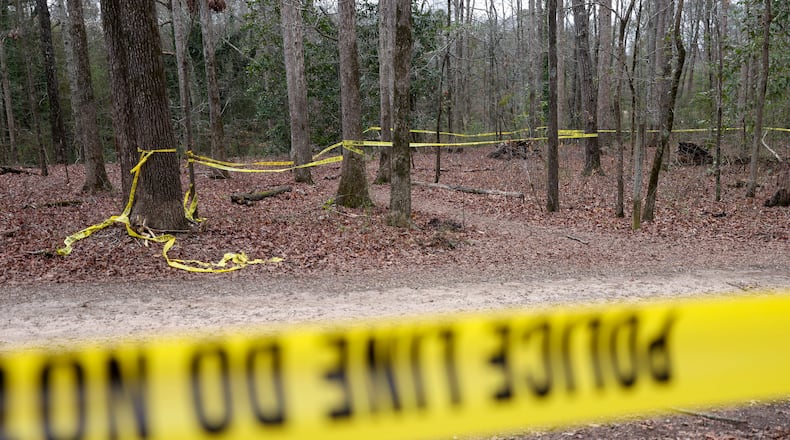ATHENS — It was a chilly, cloudy morning just before 9 a.m. on Feb. 22 when Laken Riley began her usual morning jog.
Home security camera footage showed the 22-year-old nursing student leave her house and, minutes later, a University of Georgia camera captured Riley enter the woods that lead to unpaved trails near intramural fields.
Cameras show Jose Ibarra, too, disappearing into woods near his apartment complex and later surfacing at the intramural fields.
From there, only data from Riley’s cellphone and Garmin watch tracked her final moments after she crossed paths with Ibarra, the man found guilty Wednesday of trying to rape her and eventually killing her in a stretch of forest that was sparsely populated that day.
“We will never know what he did to her on that trail, and in what order,” special prosecutor Sheila Ross said during her closing arguments in the murder trial.
In the nine months that have passed since Riley was killed, a crime that shook the community, the university has taken steps to address some of the blind spots on the popular running trails and to make it harder to access the paths from off-campus locations.
The entry point to the trails that both Riley and Ibarra used that morning and another one near Ibarra’s apartment are now blocked. UGA installed 8-foot tall fencing. Emergency call boxes now line the trails, making it easier to reach out for help. The boxes have cameras pointed in four directions that record 24 hours a day, university spokesperson Greg Trevor said.
Credit: Fletcher Page
Credit: Fletcher Page
The measures are part of a $7.3 million plan to boost security that was announced by the school in July.
“There is no higher priority at the University of Georgia than safety and security of our campus community,” UGA President Jere Morehead said at the time.
Some parents and residents say more is needed. Wednesday, after Ibarra’s trial came to an end, SafeD Athens and UGA Parents for Safety and Security called for further improvements.
In a joint statement, the groups said campus security cameras need to be integrated with the Athens-Clarke County Police Department Real-Time Crime Center.
In the prosecution of Ibarra, authorities relied on cameras to prove his whereabouts. There were private security cameras at apartments in the complex where he lived, including one trained on a dumpster where he discarded evidence. A UGA camera captured him attempting to break into a female student’s apartment less than two hours before he attacked Riley.
Still, the groups argue, more integration would allow for more seamless tracking of individuals who are up to no good.
They also want the university to increase the presence of safety ambassadors, in addition to police, on trails and green spaces. Safety ambassadors act as eyes and ears for police personnel, according to the UGA police website.
The school emphasized that safety is not a new priority. UGA spent $16 million on safety and security enhancements during the eight years preceding Riley’s killing, Dr. P. Daniel Silk, UGA associate vice president for public safety, wrote in an op-ed piece in response to the statement issued by SafeD Athens and UGA Parents for Safety and Security.
Silk added that there are limits to what officials can do.
“There is not a police chief, parent or university administrator I have ever met who would not leap at the chance to genuinely guarantee 100% safety,” he said. “As much as it pains me to say it, it’s not a promise we can make. We can, however, commit ourselves to doing all we reasonably can, in conjunction with our community partners, to strive to make our campus safer every day.”
Meanwhile, some female runners say they have yet to return to the trails where Riley died.
On Thursday, few people were out at 9 a.m.
Two emergency call boxes — tall rectangle boxes painted bright yellow with illuminated red lights at the top — are near the spot where Riley embarked on her trail route, an area densely filled with oaks, magnolias and strawberry bushes.
They are among the 14 boxes that were installed. Another six are at other locations on campus, and more are coming, UGA spokesperson Cole Sosebee said.
Brad Frink is an avid runner who lives not far from the trails. To him, it seems that activity on the trails near the intramural fields has returned to normal.
“I routinely see individuals, both men and women, running and walking in this area,” he said, “as well as all up and down the Milledge corridor at all times of day and night.”
Credit: Fletcher Page
Credit: Fletcher Page
About the Author
Keep Reading
The Latest
Featured




